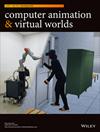桌面VR中的读者剧场:九年级学生的试点研究
IF 1.7
4区 计算机科学
Q4 COMPUTER SCIENCE, SOFTWARE ENGINEERING
引用次数: 0
摘要
提高阅读流畅性的适当技巧在课堂上很难实施。很少有时间为学生提供关于大声朗读的个性化反馈或激励他们这样做。在这种情况下,虚拟现实(VR)可以对学习有益,因为它允许个性化反馈并提高学习者的参与度。目前还缺乏对虚拟现实语言学习方法进行分析的研究。因此,本试点研究是第一个分析学生对中学桌面VR阅读流畅性训练接受程度的研究之一。访谈指南是根据技术接受模型开发的。桌面虚拟现实环境是基于网络的,为训练阅读流畅性、给予和接受反馈以及加深对阅读文本的内容理解提供了个人和协作的机会。为了分析桌面VR环境的接受度,我们进行了五次引导访谈。结果表明,尽管在VR环境中存在各种技术挑战,但学生不仅接受而且欣赏VR中的阅读流畅性训练。在外语课堂中整合已有的阅读流畅性训练概念对于解决面对面教学的挑战具有巨大的潜力。本文章由计算机程序翻译,如有差异,请以英文原文为准。
Readers Theater in Desktop VR: A Pilot Study with Grade Nine Students
Appropriate techniques for promoting reading fluency are difficult to implement in the classroom. There is little time to provide students with individualized feedback on reading aloud or to motivate them to do so. In this context, Virtual Reality (VR) can be beneficial for learning because it allows for individualized feedback and for increasing learner engagement. Studies that analyze established methods of language learning in VR at school are thus far lacking. Therefore, this pilot study is one of the first to analyze student acceptance of reading fluency training in desktop VR at a secondary school. The interview guide was developed in accordance with the Technology Acceptance Model. The desktop VR environment is web-based and provides individual and collaborative opportunities for training reading fluency, giving, and receiving feedback, and deepening content understanding of reading texts. To analyze the acceptance of the desktop VR environment, five guided interviews were conducted. The results reveal that despite various technical challenges within the VR environment, students not only accepted but also appreciated the reading fluency training in VR. The integration of established concepts of reading fluency training in foreign language classrooms has great potential as an additional value in addressing the challenges of face-to-face instruction.
求助全文
通过发布文献求助,成功后即可免费获取论文全文。
去求助
来源期刊

Computer Animation and Virtual Worlds
工程技术-计算机:软件工程
CiteScore
2.20
自引率
0.00%
发文量
90
审稿时长
6-12 weeks
期刊介绍:
With the advent of very powerful PCs and high-end graphics cards, there has been an incredible development in Virtual Worlds, real-time computer animation and simulation, games. But at the same time, new and cheaper Virtual Reality devices have appeared allowing an interaction with these real-time Virtual Worlds and even with real worlds through Augmented Reality. Three-dimensional characters, especially Virtual Humans are now of an exceptional quality, which allows to use them in the movie industry. But this is only a beginning, as with the development of Artificial Intelligence and Agent technology, these characters will become more and more autonomous and even intelligent. They will inhabit the Virtual Worlds in a Virtual Life together with animals and plants.
 求助内容:
求助内容: 应助结果提醒方式:
应助结果提醒方式:


